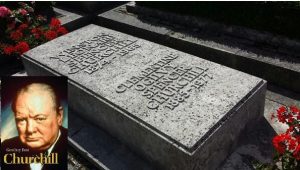George, David Lloyd, born 17-01-1863 in Manchester,  to Welsh parents. From around three months of age he was raised in Pembrokeshire and Llanystumdwy, Caernarfonshire, speaking Welsh. His father, a schoolmaster, died in 1864, and David was raised by his mother and her shoemaker brother, whose Liberal politics and Baptist faith strongly influenced Lloyd George; the same uncle helped the boy embark on a career as a solicitor after leaving school.was a British Liberal politician and statesman. He was Prime Minister of the United Kingdom at the head of a wartime coalition government between the years 1916-1922 and was the Leader of the Liberal Party.
to Welsh parents. From around three months of age he was raised in Pembrokeshire and Llanystumdwy, Caernarfonshire, speaking Welsh. His father, a schoolmaster, died in 1864, and David was raised by his mother and her shoemaker brother, whose Liberal politics and Baptist faith strongly influenced Lloyd George; the same uncle helped the boy embark on a career as a solicitor after leaving school.was a British Liberal politician and statesman. He was Prime Minister of the United Kingdom at the head of a wartime coalition government between the years 1916-1922 and was the Leader of the Liberal Party. Lloyd George was a Welsh-speaker and of Welsh descent and upbringing, the first and so far only Welsh politician ever to hold the office of Prime Minister. He supported World War I when it broke out, not least as Belgium, for whose defense Britain was supposedly fighting, was a “small nation” like Wales or indeed the Boers. George was made Minister of Munitions in a new department created after a munitions shortage. In this position he was a brilliant success, but he was not at all satisfied with the progress of the war, and late in 1915 he became a strong supporter of general conscription. Lloyd George became Prime Minister, with the nation demanding he take charge of the war in vigorous fashion. Conservative leader Austen Neville Chamberlain
Lloyd George was a Welsh-speaker and of Welsh descent and upbringing, the first and so far only Welsh politician ever to hold the office of Prime Minister. He supported World War I when it broke out, not least as Belgium, for whose defense Britain was supposedly fighting, was a “small nation” like Wales or indeed the Boers. George was made Minister of Munitions in a new department created after a munitions shortage. In this position he was a brilliant success, but he was not at all satisfied with the progress of the war, and late in 1915 he became a strong supporter of general conscription. Lloyd George became Prime Minister, with the nation demanding he take charge of the war in vigorous fashion. Conservative leader Austen Neville Chamberlain
 to Welsh parents. From around three months of age he was raised in Pembrokeshire and Llanystumdwy, Caernarfonshire, speaking Welsh. His father, a schoolmaster, died in 1864, and David was raised by his mother and her shoemaker brother, whose Liberal politics and Baptist faith strongly influenced Lloyd George; the same uncle helped the boy embark on a career as a solicitor after leaving school.was a British Liberal politician and statesman. He was Prime Minister of the United Kingdom at the head of a wartime coalition government between the years 1916-1922 and was the Leader of the Liberal Party.
to Welsh parents. From around three months of age he was raised in Pembrokeshire and Llanystumdwy, Caernarfonshire, speaking Welsh. His father, a schoolmaster, died in 1864, and David was raised by his mother and her shoemaker brother, whose Liberal politics and Baptist faith strongly influenced Lloyd George; the same uncle helped the boy embark on a career as a solicitor after leaving school.was a British Liberal politician and statesman. He was Prime Minister of the United Kingdom at the head of a wartime coalition government between the years 1916-1922 and was the Leader of the Liberal Party. Lloyd George was a Welsh-speaker and of Welsh descent and upbringing, the first and so far only Welsh politician ever to hold the office of Prime Minister. He supported World War I when it broke out, not least as Belgium, for whose defense Britain was supposedly fighting, was a “small nation” like Wales or indeed the Boers. George was made Minister of Munitions in a new department created after a munitions shortage. In this position he was a brilliant success, but he was not at all satisfied with the progress of the war, and late in 1915 he became a strong supporter of general conscription. Lloyd George became Prime Minister, with the nation demanding he take charge of the war in vigorous fashion. Conservative leader Austen Neville Chamberlain
Lloyd George was a Welsh-speaker and of Welsh descent and upbringing, the first and so far only Welsh politician ever to hold the office of Prime Minister. He supported World War I when it broke out, not least as Belgium, for whose defense Britain was supposedly fighting, was a “small nation” like Wales or indeed the Boers. George was made Minister of Munitions in a new department created after a munitions shortage. In this position he was a brilliant success, but he was not at all satisfied with the progress of the war, and late in 1915 he became a strong supporter of general conscription. Lloyd George became Prime Minister, with the nation demanding he take charge of the war in vigorous fashion. Conservative leader Austen Neville Chamberlain
 was responsibly for George losing his power. In March 1936 Lloyd George met Adolf Hitler (see Hitler parents) (see William Hitler) at the Berghof in Berchtesgaden and offered some public comments that were surprisingly favorable to the German dictator, expressing warm enthusiasm both for Hitler personally and for Germany’s public works schemes, upon returning, he wrote of Hitler in the Daily Express as “the greatest living German”, “the George Washington of Germany”. Despite this embarrassment, however, as the 1930s progressed Lloyd George became more clear-eyed about the Nazi threat and joined Winston Churchill,
was responsibly for George losing his power. In March 1936 Lloyd George met Adolf Hitler (see Hitler parents) (see William Hitler) at the Berghof in Berchtesgaden and offered some public comments that were surprisingly favorable to the German dictator, expressing warm enthusiasm both for Hitler personally and for Germany’s public works schemes, upon returning, he wrote of Hitler in the Daily Express as “the greatest living German”, “the George Washington of Germany”. Despite this embarrassment, however, as the 1930s progressed Lloyd George became more clear-eyed about the Nazi threat and joined Winston Churchill,  among others, in fighting the government’s policy of appeasement. In the late 1930s he was sent by the British government to try to dissuade Adolf Hitler
among others, in fighting the government’s policy of appeasement. In the late 1930s he was sent by the British government to try to dissuade Adolf Hitler  from his plans of Europe-wide expansion. A pessimistic speech by Lloyd George on 07-05-1941 led Churchill to compare him with Henry Philippe Petain.
from his plans of Europe-wide expansion. A pessimistic speech by Lloyd George on 07-05-1941 led Churchill to compare him with Henry Philippe Petain. 

Lloyd George had a considerable reputation as a womanise. He had five children by his first wife , Margaret:
Margaret:  Richard
Richard  (1889–1968), Mair (1890–1907
(1889–1968), Mair (1890–1907 
 , who died during an appendectomy, Olwen
, who died during an appendectomy, Olwen  (1892–1990), Gwilym
(1892–1990), Gwilym  (1894–1967) and Megan (1902–1966)
(1894–1967) and Megan (1902–1966) 
 . LLoyd George remained married to Margaret, and remained fond of her until her death on 20-01-1941; Lloyd George was deeply upset by the fact that bad weather prevented him from being with her when she died.
. LLoyd George remained married to Margaret, and remained fond of her until her death on 20-01-1941; Lloyd George was deeply upset by the fact that bad weather prevented him from being with her when she died.
 Margaret:
Margaret:  Richard
Richard  (1889–1968), Mair (1890–1907
(1889–1968), Mair (1890–1907 
 , who died during an appendectomy, Olwen
, who died during an appendectomy, Olwen  (1892–1990), Gwilym
(1892–1990), Gwilym  (1894–1967) and Megan (1902–1966)
(1894–1967) and Megan (1902–1966) 
 . LLoyd George remained married to Margaret, and remained fond of her until her death on 20-01-1941; Lloyd George was deeply upset by the fact that bad weather prevented him from being with her when she died.
. LLoyd George remained married to Margaret, and remained fond of her until her death on 20-01-1941; Lloyd George was deeply upset by the fact that bad weather prevented him from being with her when she died.His son, Gwilym and his daughter, Megan, both followed him into politics, and were elected members of parliament. They were politically faithful to their father throughout his life, but after 1945 each drifted away from the Liberal Party, Gwilym finishing his career as a Conservative Home Secretary and Megan becoming a Labour MP in 1957, perhaps symbolising the fate of much of the old Liberal Party.
In October 1943, aged 80, and to the disapproval of his children, he married his secretary and mistress, Frances Stevenson  . He had first met Stevenson in 1910, and she had worked for him first as a teacher for Megan in 1911; their affair began in early 1913.
. He had first met Stevenson in 1910, and she had worked for him first as a teacher for Megan in 1911; their affair began in early 1913.
 . He had first met Stevenson in 1910, and she had worked for him first as a teacher for Megan in 1911; their affair began in early 1913.
. He had first met Stevenson in 1910, and she had worked for him first as a teacher for Megan in 1911; their affair began in early 1913.Death and burial ground of George, David Lloyd.


 He died of cancer on 26-03-1945, aged 82, his wife Frances and his daughter Megan at his bedside. Four days later, on Good Friday, he was buried David Lloyd George Memorial Site Llanystumdwy Gwynedd, Wales. Plot, on the banks of the River Dwyfor.
He died of cancer on 26-03-1945, aged 82, his wife Frances and his daughter Megan at his bedside. Four days later, on Good Friday, he was buried David Lloyd George Memorial Site Llanystumdwy Gwynedd, Wales. Plot, on the banks of the River Dwyfor.




Message(s), tips or interesting graves for the webmaster: robhopmans@outlook.com
















Leave a Reply